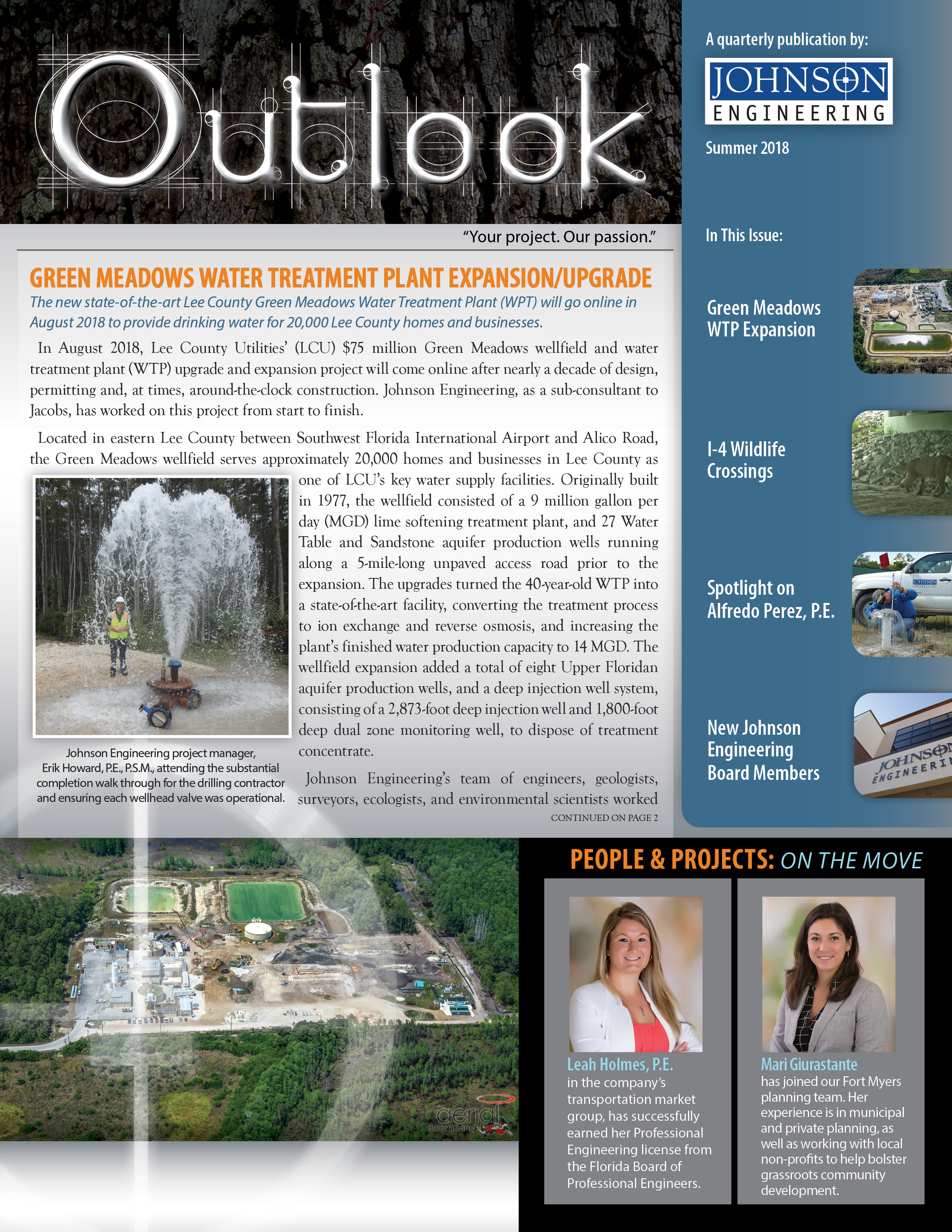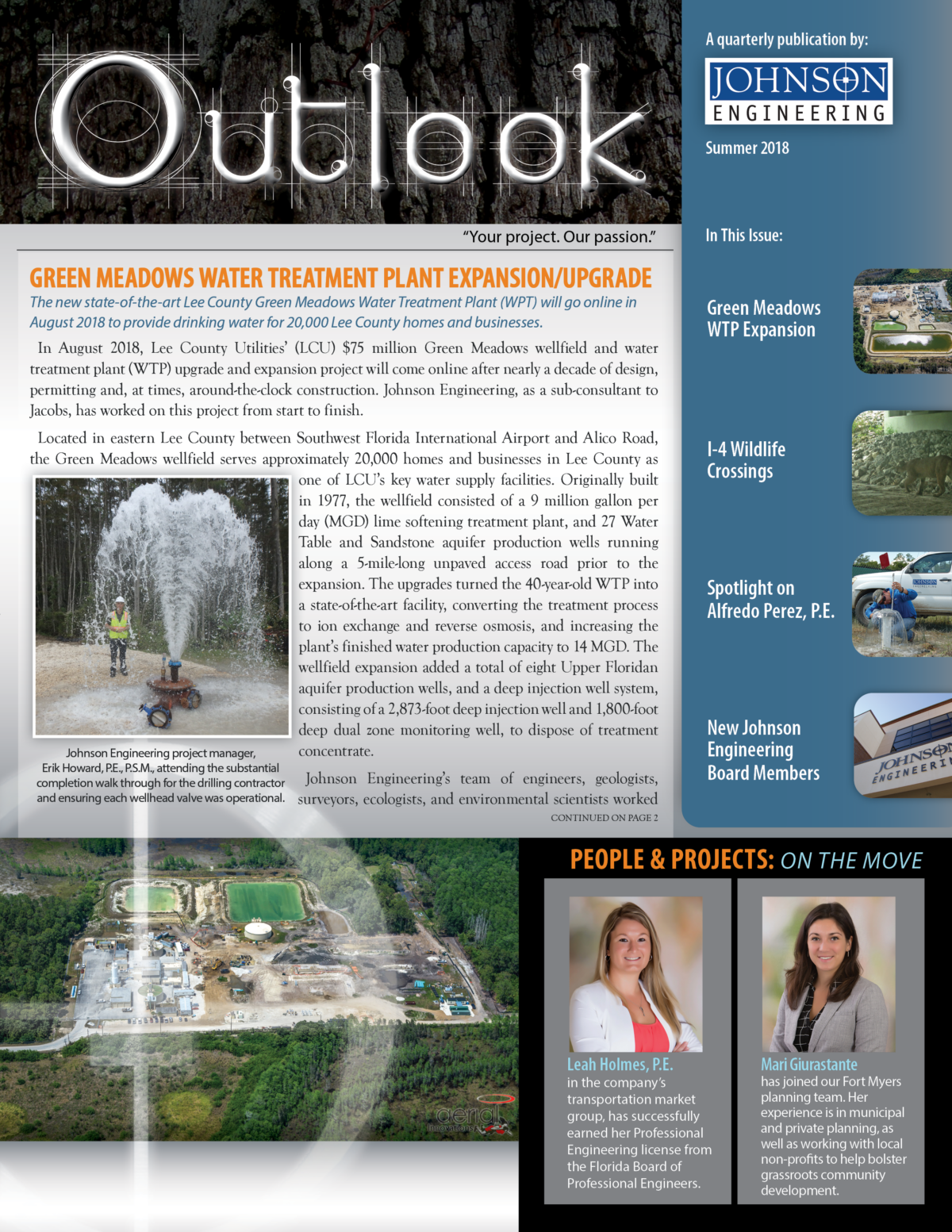 In August 2018, Lee County Utilities’ (LCU) $75 million Green Meadows wellfield and water treatment plant (WTP) upgrade and expansion project will come online after nearly a decade of design, permitting and, at times, around-the-clock construction. Johnson Engineering, as a sub-consultant to Jacobs, has worked on this project from start to finish.
In August 2018, Lee County Utilities’ (LCU) $75 million Green Meadows wellfield and water treatment plant (WTP) upgrade and expansion project will come online after nearly a decade of design, permitting and, at times, around-the-clock construction. Johnson Engineering, as a sub-consultant to Jacobs, has worked on this project from start to finish.
Located in eastern Lee County between Southwest Florida International Airport and Alico Road, the Green Meadows wellfield serves approximately 20,000 homes and businesses in Lee County as one of LCU’s key water supply facilities. Originally built in 1977, the wellfield consisted of a 9 million gallon per day (MGD) lime softening treatment plant, and 27 Water Table and Sandstone aquifer production wells running along a 5-mile-long unpaved access road prior to the expansion. The upgrades turned the 40-year-old WTP into a state-of-the-art facility, converting the treatment process to ion exchange and reverse osmosis, and increasing the plant’s finished water production capacity to 14 MGD. The wellfield expansion added a total of eight Upper Floridan aquifer production wells, and a deep injection well system, consisting of a 2,873-foot deep injection well and 1,800-foot deep dual zone monitoring well, to dispose of treatment concentrate.
Johnson Engineering’s team of engineers, geologists, surveyors, ecologists, and environmental scientists worked alongside Jacobs and electrical sub-consultant RKS Consulting Engineers to prepare production well and injection well, raw water pipeline, and access road construction plans and specifications; obtain Florida Department of Environmental Protection (FDEP) Underground Injection Control (UIC) and South Florida Water Management District (SFWMD) Environmental Resource (ERP) permits; and provide construction observation services for the wellfield and access road expansion. The design process began with extensive field data collection from the existing system to develop a hydraulic model of 30 wells pumping water from three aquifers, through 40,000 feet of additional parallel pipelines to assess future wellfield operations.
Located adjacent to environmentally-sensitive areas, special considerations were given to the permitting, design, and construction of the project to minimize disturbances to the sensitive species of Imperial Marsh. To aid in the design, field survey crews were onsite early in the project, collecting 10,000+ survey points, at times waist-deep in water. The result was an improved 5-mile-long wellfield access road with a total of sixty-seven 36-inch diameter culverts, with 12 culverts alone at Imperial Marsh to help maintain sheetflow, while also allowing LCU staff to inspect and maintain distant production wells.
During construction, our team worked closely with Mikes Maillakakis, P.E., the LCU Project Manager, to help coordinate up to six contractors working concurrently. Field engineers and geologists were onsite continuously during construction of six Upper Floridan aquifer production wells, and the FDEP Class I deep injection well system, which entailed a 24/7 construction schedule. All six Upper Floridan aquifer wells were productive, including one well that free-flows at 2,000 gpm. Due to the sensitive nature of the project site, Johnson Engineering biologists provided special training to contractors on identification and protection of state and federally-listed Eastern indigo snake.
The end result increases the capacity and reliability of the Green Meadows system, while improving access for LCU staff with minimal impacts to the surrounding preserve lands.
For more information, contact Erik Howard, P.E., P.S.M. at [email protected].

































































